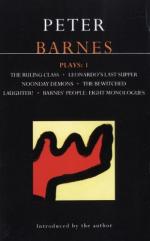|
This section contains 599 words (approx. 2 pages at 400 words per page) |

|
The Liberal 1960s
The 1960s were a time of defiant liberation in society, from politics, art, and music to dress, hairstyles, and morals. The "Liverpool poets" reflected the mood of elation and questioning in its poetry of pop culture, while music throbbed to a new beat and students took to the streets to protest all forms of oppression. Alongside the monolithic publishing houses, small presses sprang into being and thrived, producing avant-garde works in a distributed network of artists.
Inroads were developing into every aspect of culture; power was being redistributed. In England, where the noble class had always enjoyed prestige, the attitude of the middle class toward gentility (and toward the whole concept of gentility) moved from muffled but tolerant resentment to active disrespect. While much of the rhetoric of the 1960s was rancorous, Barnes's The Ruling Class introduced comedy to question the status quo. While the...
|
This section contains 599 words (approx. 2 pages at 400 words per page) |

|




